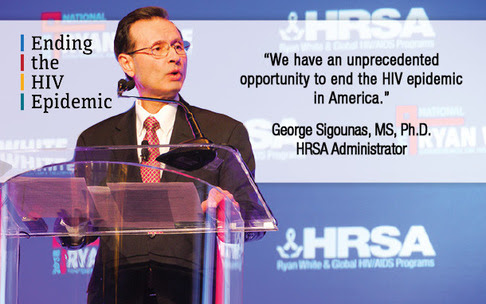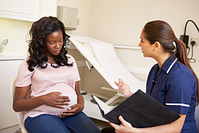
HRSA Supports Trump Administration's Plan to End the HIV Epidemic

The Health Resources and Services Administration (HRSA) fully supports the Trump Administration's initiative: Ending the HIV Epidemic: A Plan for America.
Through HRSA's Ryan White HIV/AIDS Program and the HRSA-funded Health Center Program, the agency will play a leading role in helping to diagnose, treat, prevent and respond to end the HIV epidemic.
"We have an unprecedented opportunity to end the HIV epidemic in America. Through this initiative, in 2020, HRSA would work with program recipients to expand evidence-informed interventions proven to increase engagement and retention in care, reduce stigma, and improve viral suppression for the hardest to reach individuals," said HRSA Administrator George Sigounas, MS, Ph.D. "HRSA's Health Center Program will play a major expanded role in providing Pre Exposure Prophylaxis (PrEP) to those populations at the greatest risk of acquiring HIV infection."
Learn about the initiative Ending the HIV Epidemic: a Plan for America.
Dr. Sigounas Hosts Rural Advocates
 |
HHS Secretary Alex Azar (center, left) and HRSA Administrator Dr. George Sigounas met with rural experts, advisors and representatives on Jan. 28 for a day-long listening session at HHS Headquarters. Secretary Azar said the department has been "thinking strategically about how to improve the availability, quality, and affordability of healthcare" for the nation's rural dwellers. Dr. Sigounas provided a briefing on topics ranging from rural health system transformation and telehealth to workforce shortages and the opioid crisis.
"We know that 60 million Americans, roughly 15 percent of the U.S. population, currently live in rural areas," Dr. Sigounas said, adding: Rural residents have higher rates of chronic disease, lower life expectancy, higher mortality, and higher rates of avoidable or excess death... As longstanding partners, you know HRSA's mission. Every day, we are working to increase access to health care for people who are medically underserved or geographically isolated."
HHS Awards $11 million to Increase Access to Critical Services at School-based Health Centers

February 1 - Today the U.S. Department of Health and Human Services (HHS) Health Resources and Services Administration (HRSA) awarded $11 million in funding to 120 school-based health centers to increase access to mental health, substance abuse, and childhood obesity-related services in school-based health centers.
“School-based health centers provide access to essential health care services that improve student wellbeing and their ability and readiness to learn,” said HRSA Administrator George Sigounas, MS, Ph.D.
These funds can be used to improve existing school-based health center facilities through minor alteration and renovation activities and/or to purchase equipment, including telehealth equipment.
|
New Rural Communities Opioid Response Program Funding Opportunity

February 4 - The Health Resources and Services Administration's (HRSA) Federal Office of Rural Health Policy will be releasing a Notice of Funding Opportunity for a new Rural Communities Opioid Response Program (RCORP) initiative called RCORP-Implementation (HRSA-19-082). HRSA plans to award approximately 75 grants, of up to $1 million each, to enhance substance and opioid use disorder prevention, treatment, and recovery service delivery in rural communities.
The funding opportunity will be posted in the next few weeks.
|
Strengthening Systems of Care for People Living with HIV and Opioid Use Disorder

HRSA's HIV/AIDS Bureau released a Notice of Funding Opportunity (NOFO) for a new three-year Ryan White HIV/AIDS Program (RWHAP) Part F Special Projects of National Significance (SPNS) initiative entitled Strengthening Systems of Care for People Living with HIV and Opioid Use Disorder.
The Initiative will fund an estimated one to four entities, referred to as System Coordination Providers (SCPs), to assist states in leveraging resources at federal, state, and local levels for people living with HIV (PLWH) and opioid use disorder (OUD). The initiative’s goal is to strengthen system-level coordination and networks of care between RWHAP recipients and other federal, state and local entities funded to respond to the recent opioid epidemic, so that PLWH and OUD will have access to behavioral health care, treatment, and recovery services.
Read the Notice of Funding Opportunity. Responses are due April 16.
A pre-application webinar related to the NOFO is scheduled for February 13, from 2-3:30 pm ET.
|
National Black HIV/AIDS Awareness Day

February 7, marks the annual observance of National Black HIV/AIDS Awareness Day. For HRSA’s Ryan White HIV/AIDS Program (RWHAP), this observance provides an opportunity to increase awareness about the importance of HIV care and treatment services for black/African Americans, a population that disproportionately faces HIV-related health disparities.
In 2017, nearly three-quarters of the more than half a million clients served by the Ryan White HIV/AIDS Program were from racial or ethnic minority populations, with more than 47 percent of clients identifying as black/African American. Among black/African American RWHAP clients receiving HIV medical care, 82.6 percent are virally suppressed, which is lower than the national RWHAP viral suppression average (85.9 percent).
|
National Donor Day

Share some love this Valentine’s Day by celebrating National Donor Day on February 14th.
Signing up as an organ, eye, and tissue donor is like sending a valentine to the 114,000+ people on the national transplant waiting list. Tell your family and loved ones about your decision to donate and leave your stamp on the world.
Learn more about organ donation at organdonor.gov and donaciondeorganos.gov.
|
HRSA's Maternal and Child Health Bureau Announces Phase 1 Winners of its Addressing Opioid Use Disorder in Pregnant Women and New Moms Grand Challenge

HRSA's Maternal and Child Health Bureau has selected 10 winners from Phase 1 of the Addressing Opioid Use Disorder in Pregnant Women and New Moms Grand Challenge.
Each Phase 1 winner received a share of a $100,000 cash prize and will move on to Phase 2 to develop their prototype and begin small-scale testing through July 2019.
The winning innovations are technology-based solutions to improve access to quality health care for pregnant women and new mothers struggling with opioid use disorder. The innovations aim to reduce barriers in obtaining safe and effective care and treatment, especially for families in rural and geographically isolated areas.
The innovations selected target different populations, including care providers, families in rural and frontier areas, pregnant women, new moms and children with neonatal abstinence syndrome.
|
Infographic: HRSA Delivers for Women’s Health

Women make 80% of the health care decisions in the U.S. but many go without health care themselves. HRSA grant-funded programs help women by:
Download the new women’s health infographic (PDF - 344 KB) and learn how HRSA delivers critical health services for women.
|
HRSA-led Study Reveals Utilization of Emergency Care During Pregnancy

A study of 107,207 pregnant Medicaid recipients in North Carolina, led by HRSA authors, found that 57.5% of pregnant mothers sought emergency care at least once during their pregnancy.
Women most frequently visited the Emergency Department (ED) or obstetric triage unit later in pregnancy for threatened labor and abdominal pain, while bleeding and nausea or vomiting were most common in the first trimester. Almost one-fifth of the population was characterized as a “high utilizer” (> 4 visits). These women were more likely to deliver in the late preterm period and have multiple medical conditions compared to women who utilized emergency care less often.
Additional research is needed to assess the drivers for accessing care through the emergency department, and to inform efforts to improve appropriate use of emergency care services, such as educating women about available services and how best to use them.
Read the abstract from the Maternal and Child Health Journal and learn how HRSA’s Emergency Medical Services for Children program is helping mothers and children in prehospital and hospital emergency medical systems.
|
How We Became Million Hearts Hypertension Champions

The CDC Million Hearts® Hypertension Control Challenge is a competition to identify clinicians, practices, and health systems that have demonstrated exceptional achievements in working with their patients to control hypertension. Champions achieved at least 80% blood pressure control (blood pressure reading <140 18="" 2018="" 85.="" a="" ages="" among="" as="" cdc="" centers:="" centers="" champions.="" control="" five="" from="" health="" heart="" hrsa-funded="" hrsa="" hypertension="" hypertensive="" in="" join="" learn="" mmhg="" month="" of="" p="" population="" recognized="" their="" these="" this="" three="" to="" webinar="">
Thursday, February 212:00-3:00 p.m. ET
Join the webcast the day of the session Call-in: 888-233-9404 Passcode: 2662064
In 2017, almost 63% of health center patients diagnosed with hypertension had controlled blood pressure. See more data about health center patients.
|
February is Teen Dating Violence Awareness Month

Dating violence is a form of intimate partner violence (IPV). Teen Dating Violence Awareness Month represents a national effort to raise awareness and protect teens from violence. In the past year, 1 in 10 teens has been physically abused by a boyfriend or girlfriend.
|
8 Billion Pills … and Counting

In the midst of what has been called the most severe public health crisis since the onset of the HIV/AIDS epidemic, some eight billion new doses of opioid painkillers were legally prescribed last year, according to a leading expert.
Dr. Robert Valuck told listeners in a January webcast that seven out of 10 opioid misusers initially get them from someone in their immediate social circle – and that continued overprescribing by doctors and dentists is feeding a virtual stockpile of unused meds in American homes. Most illicit use, he added, "is leftover opioids that are sitting around in medicine cabinets. People either get them, buy them, steal them or get handed them by a family member." |
The Hidden Risks of Maternal Depression

While it's well-known that the "Baby Blues" are common, many psychiatrists are uncomfortable treating mothers in distress, and obstetricians are often unfamiliar with how best to intervene -- especially in rural areas where care is scarce -- experts at a recent webinar reported.
"Even if a woman tests positive for depression, less than a quarter of those women are going to get to even an initial mental health appointment," reported Dr. Nancy Byatt. "And far less than that will actually engage in ongoing treatment." Byatt is a leading authority on maternal mental health at the University of Massachusetts Medical School, and executive director of the state's model Lifeline4Moms program. |





















.png)









No hay comentarios:
Publicar un comentario